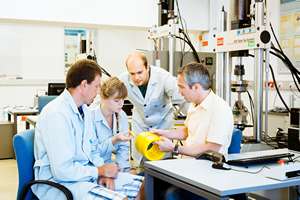What plastic pipelines contribute to safeguarding today’s infrastructure and our high standard of living is inconspicuous and yet extremely important. They are needed to supply households with water and gas and ensure the safe removal of sewage. The research activities undertaken by the Plastic Pipes group mainly draw on concepts of linear elastic fracture mechanics besides using conventional mechanical and thermo-mechanical testing methods.
 A major role is played by the cracked round bar (CRB) test, which was developed in Leoben and has come to be a standard that is used internationally for the assessment of the resistance of pipe materials to slow crack growth. This method permits not only a qualitative ranking of materials but also an in-depth analysis of crack initiation and crack growth properties and, consequently, makes precise fracture mechanics based lifetime prediction possible. Of particular interest is assessing the effects that admixing recycled materials, or using only recycled materials, will have on the long-term failure behavior of pipes for non-pressurized applications.
A major role is played by the cracked round bar (CRB) test, which was developed in Leoben and has come to be a standard that is used internationally for the assessment of the resistance of pipe materials to slow crack growth. This method permits not only a qualitative ranking of materials but also an in-depth analysis of crack initiation and crack growth properties and, consequently, makes precise fracture mechanics based lifetime prediction possible. Of particular interest is assessing the effects that admixing recycled materials, or using only recycled materials, will have on the long-term failure behavior of pipes for non-pressurized applications.
Supplementing the analysis and prediction of damage to pipes, a further focus area is the assessment of the aging behavior of thermoplastic pipe materials under the influence of disinfectants like chlorine dioxide or sodium hypochlorite. For this purpose, a specific device was developed at the PCCL which allows exposing materials to precisely regulated and stable media conditions. The studies performed in this field focus both on the development of new pipe materials and on the optimization of stabilizing systems. The competences of the Plastic Pipes group include, among others:
- The cyclical CRB test as a new method for accelerated crack growth characterization
- Fracture mechanics based lifetime assessment of PE pipe systems
- Thermo-oxidative material aging and residual lifetimes of plastic pipes
- Accelerated material aging under the influence of disinfectants















